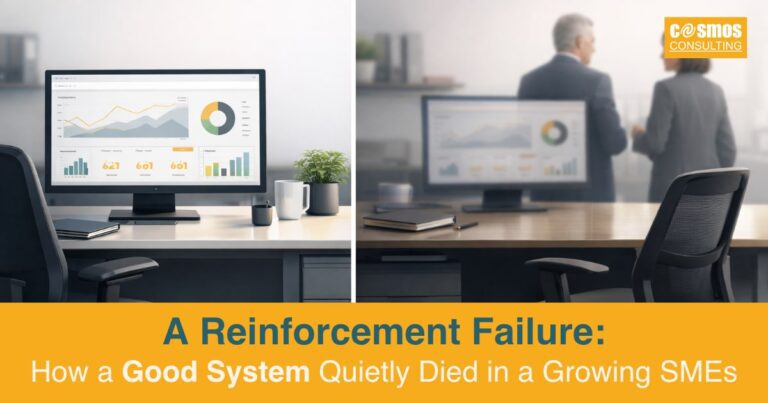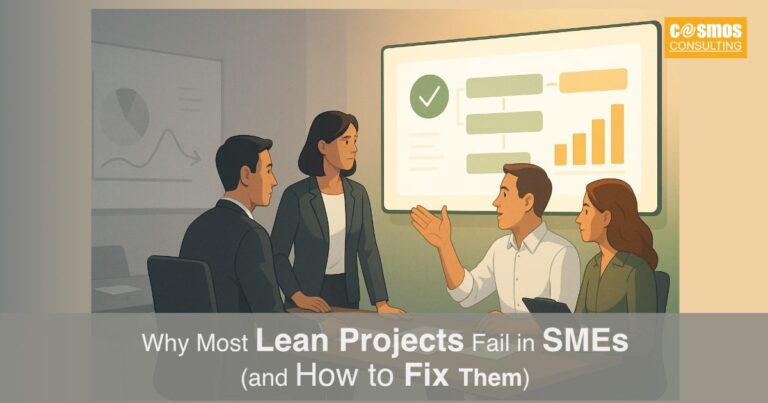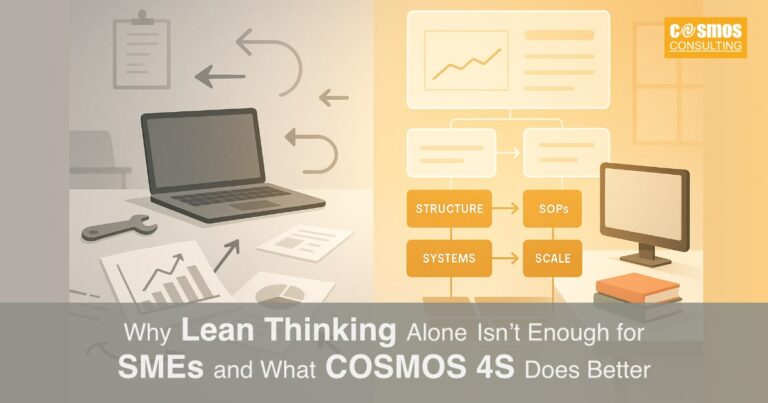🚧 Why Structure for SME Operations Matters
If everything in your business still runs through you, that is not control; that is a bottleneck.
And no, trust me, it is not a founder flaw. It is a STRUCTURE GAP.
Also, you are not alone. Most founders underestimate the role of structure for SME operations. Without clear roles and boundaries, the business leans entirely on the owner. The COSMOS 4S Framework begins here, because structure is the first step to scaling with less chaos..
You can’t scale what only lives in your head. If your team waits on you for every decision… if you are still the one fixing errors, chasing payments, approving every task – your business is not structured. It is merely surviving. The Harvard Business Review’s article on why entrepreneurs struggle to delegate touches on this exact structural blind spot.
👉 STRUCTURE for SME Operations is the first pillar of the COSMOS 4S Systems Framework™ by Cosmos Consulting, and for good reason. Without it, everything else becomes reactive:
- Strategy has no anchor
- Style becomes inconsistent
- Scaling? Nearly impossible
💡 This is the first step of the COSMOS 4S Systems Framework™, a practical approach to systemising your SME without chaos.
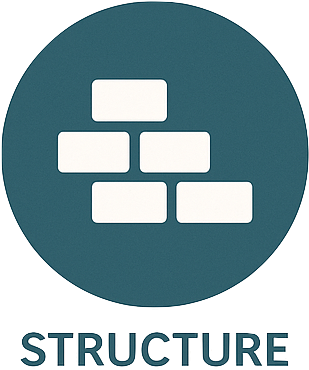
Define roles, workflows, and tools
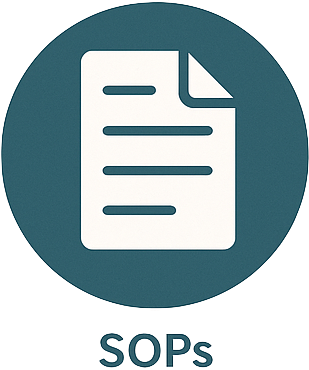
Document how work gets done
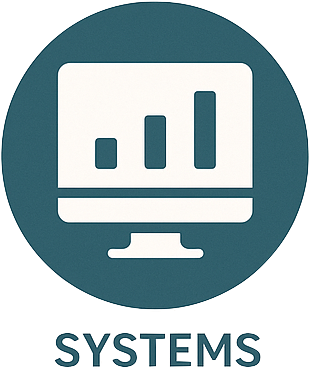
Build tech, templates, or automations

Delegate with clarity and track performance
🧱 Why Most SMEs Struggle Without a Structure Framework
When SME founders hear structure, the mind often jumps to:
❌ Org charts
❌ Bureaucracy
❌ More layers
But true structure is lean and liberating.
Cosmos 4S Systems Framework™ Definition of Structure:
A lightweight system of clear roles, repeatable workflows, and usable tools, designed to reduce dependency on any one person.
Common Misconceptions vs Reality in a Small Business Structure
| ❌ Misconception | ✅ Reality |
|---|---|
| ❌ Rigid hierarchy | ✅ Clear ownership |
| ❌ Bureaucracy | ✅ Simple, lean SOPs |
| ❌ Extra layers | ✅ Streamlined decision flow |
🏗️ How to Build Structure for SME Operations (Step by Step)
Think of structure for SME Operations as scaffolding. It is not the building, but without it, everything wobbles.
Instead of chasing every task yourself, this small business structure framework helps you assign ownership, reduce friction, and create visible progress.
1️⃣ People & Roles: Who Owns What?
In many SMEs, everyone helps with everything — but no one fully owns anything. That is a recipe for confusion and rework.
🧾 Real scenario: A service business where the founder handled sales, delivery, and admin. Support existed, but ownership didn’t. Tasks slipped. Priorities blurred.
✅ What was done:
- Mapped all business functions (sales, delivery, ops)
- Grouped similar tasks
- Assigned ownership with backups
- Introduced weekly alignment meetings

📌 Result: The founder was no longer the default for every decision. With clear ownership in place, the team started taking charge confidently and consistently.
2️⃣ Processes & Documentation: Clarity Over Memory
In a mid-sized manufacturing firm, the order process “lived in people’s heads.” When someone was away, everything stalled.
📌 What was implemented:
- A simple visual SOP for each stage
- Steps: Order → BOM → Inventory → Schedule → Dispatch → Invoice
- Assigned owners per step
- SOPs stored digitally and placed at workstations

📌 Result: With the process mapped and ownership assigned, orders no longer stall during staff absences. Anyone could step in and keep things moving with fewer errors, faster deliveries, and zero guesswork.
3️⃣ Tools & Tracking: From Guesswork to Visibility
In a consulting setup, project statuses were floating across emails, WhatsApp, and team chats. Nothing was trackable at a glance.
🧰 What was suggested:
- A Kanban board showing project flow
- Cards with client info, updates, and task checklists
- A shared dashboard tracking payments, hours, and milestones

📌 Result: With a simple visual board, the founder no longer had to chase updates across emails and chats. Tasks moved clearly from “To Do” to “Done”, bringing instant visibility and smoother follow-ups.
⚠️ Common Pitfalls in Structuring
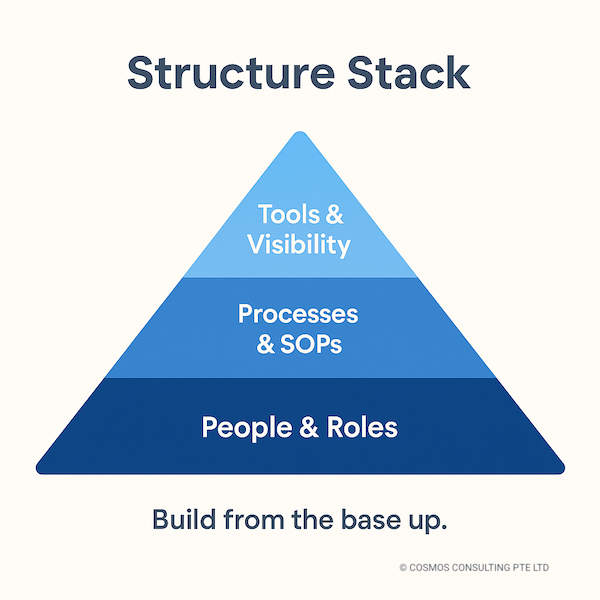
Let us name them, so you can avoid them:
🚫 Over-engineering with complex tools
🚫 Keeping everything in your head
🚫 Writing SOPs that no one reads or uses
🚫 Building once and never reviewing
✅ Start small
✅ Make it usable, not perfect
✅ Review weekly and adjust
📈 Structure for SME Operations Buys You Runway
Once structure is in place, everything gets lighter:
✔ Faster decisions
✔ Smoother handovers
✔ Team accountability
✔ More time for founders
✔ Better client delivery
And the best part?
You don’t need fancy.
You need functional.
That is why Structure for SME operations is Step 1 in the Cosmos 4S Framework.
Because nothing scales without it.
❓Frequently Asked Questions
📥 What should you do next?
Start with one small fix: a clear role, a visual SOP, or a simple tracking tool. And let structure do its job, freeing you up to lead.
💬 What is one area that could use more structure for SME Operations?
Whether it is team roles, process gaps, or tool overwhelm, share your thoughts in the comments. You are not the only one figuring it out; let us learn from each other.
Ready to build your own small business structure framework?
📥 Download the 4S Checklist or Dual Framework Guide, practical tools to help you move from chaos to clarity, one system at a time.
Get the 4S & 5R Checklists
Download this and other free templates from the
COSMOS Resources Vault.
SOP Starter Kit • 4S Checklist • Dual Framework Guide • Ready Reckoners
🎯 Resources to Help You Start:
With a clear structure for SME operations, founders free themselves from day-to-day firefighting. Download our free 4S Checklist to design the structure your SME needs to scale.
🛡 Trademark Notice
The COSMOS 4S Systems Framework™ and COSMOS 5R Leadership Framework™ are proprietary tools developed by Chhavi Jain, Director, Cosmos Consulting. These frameworks are unregistered trademarks (™) and may not be copied, reproduced, or repurposed without explicit written permission.
© Cosmos Consulting, 2025. All rights reserved.


